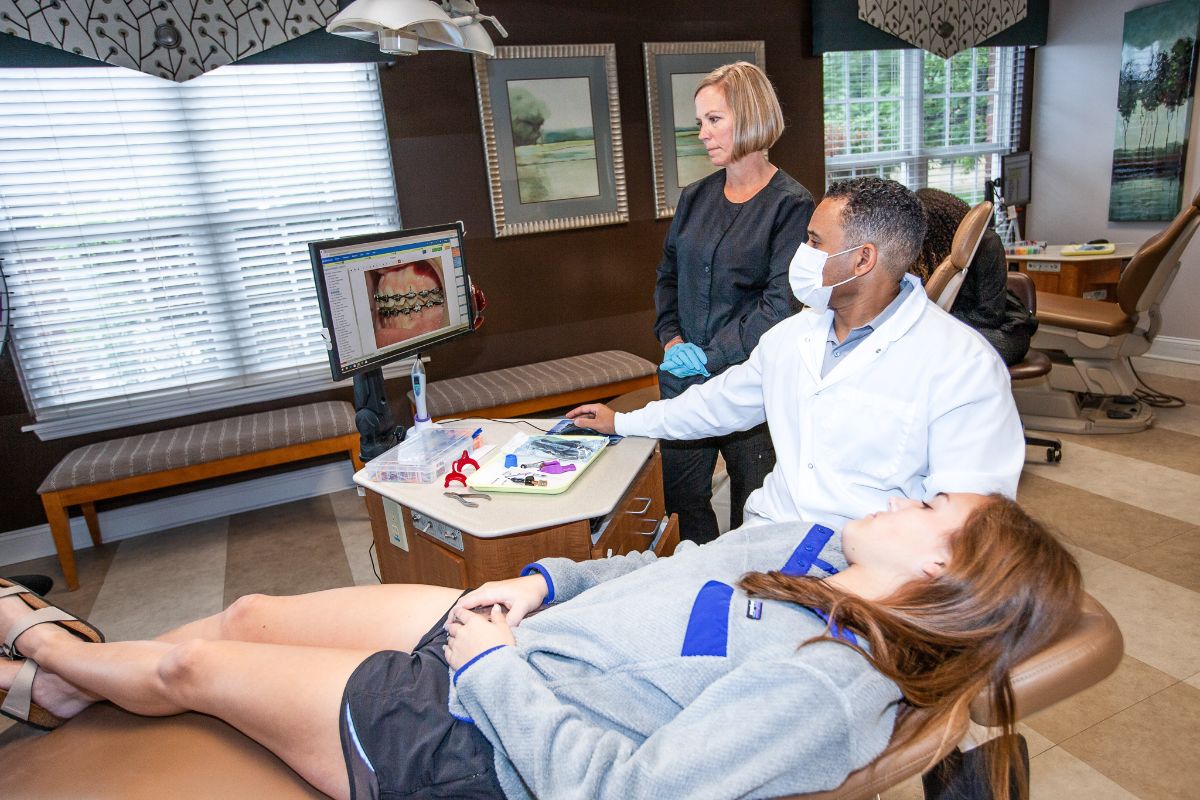A good night’s sleep is about more than feeling rested when you wake up. Studies have shown that good sleep habits are essential to keep your brain and body healthy and balanced! They also reduce your risk of developing certain diseases. While optimal sleep varies from person to person, most adults require about 7-9 hours each night to feel their best. But what happens if something is disrupting the restorative sleep that you need?
Many conditions can interrupt your sleep, including temporomandibular disorders, more commonly known as TMD. If you’ve been struggling with tiredness and irritability upon waking, TMD could be the culprit! Fortunately, there are ways to treat these disorders and get your life back! Here at Selden Orthodontics, we can help address and relieve the symptoms associated with TMD. Let’s take a closer look at these disorders and how we can treat them!
Are TMJ and TMD the same thing?
Many people use these two abbreviations interchangeably, but they’re not the same thing. TMJ is short for the temporomandibular joint, the hinge points connecting our jawbones to our head. This mobile joint is located directly in front of the ears; it rotates and glides while acting as a powerful hinge at the same time. This mobility gives us the ability to do everyday things like speak, yawn, and chew our food properly.
The TMJ is surrounded by several complex protectors like tendons, muscles, and joint pads. While these components work together in harmony most of the time, they can occasionally be thrown off course. This is where TMD comes in. Temporomandibular disorders are a group of conditions that involve issues with your TMJ and the facial muscles that control its movement. Symptoms can flare up in any of these interconnected parts, including your jaw, ears, nose, face, neck, shoulders, and upper back. These may include:
- pain or tenderness in the jaw, face, or neck
- persistent headaches
- backaches
- clicking, popping or grating sounds in your jaw
- decreased jaw mobility and trouble opening your mouth fully
- jaws that get locked in an open or closed position
If you’ve been experiencing any of these symptoms, we encourage you to schedule a complimentary consultation in our Huntersville or Charlotte offices. Dr. Selden can provide you with a proper diagnosis and discuss the available treatment options.
How does TMD affect sleep patterns?
Many patients with TMD experience some level of discomfort when they sleep. Recent studies have shown a link between TMD and sleep apnea, which occurs when the airway becomes obstructed as a person is sleeping. When oxygen is cut off, the brain alerts the heart to keep beating. This can cause the person to gasp or choke for breath, with the process repeating many times per night. Even if the patient doesn’t fully awaken during one of these episodes, the disruption alone can be enough to throw the sleep cycle off.
Sleep apnea can result from a misaligned jaw joint causing the tongue to block airways at night. Treating TMD can also treat the sleep apnea issue in cases like this! Bruxism, or teeth grinding, is another common TMD symptom that can disrupt your sleep. Bruxism occurs when your jaw muscles clench, exerting pressure on the teeth, jaw, and joints. Teeth grinding can exacerbate damage to the joints and teeth and occasionally wake you from a sound sleep.
Certain sleeping positions can also worsen TMD symptoms. For example, sleeping on your side without proper head and neck support can pressure the jaw joint, causing headaches and pain upon waking. If you sleep with your arms above your head, it can increase strain in the shoulder area. Many TMD patients find that sleeping on their back is the best position, as it helps reduce tension by keeping the spine in a neutral position.
What are the treatment options for TMD?
Many people with TMD will experience only minor symptoms that resolve on their own within a few weeks or months. During this time, symptoms can often be eased by:
- eating softer foods
- applying ice or moist heat to the affected area
- avoiding extreme jaw movements like wide yawning
- taking smaller bites of food
- alternating chewing on each side of your mouth
- exploring gentle stress-relief techniques
There are other possible causes of TMD, too. These include injury, arthritis, or an imbalance in the nerves, ligaments, and muscles. That’s why you should always seek out a proper diagnosis before deciding on a course of action. When you schedule a complimentary consultation with Dr. Selden, he’ll conduct a thorough TMJ examination if you’re showing any of the associated symptoms. Once we’ve pinpointed the cause and diagnosed TMD, we can develop a personalized treatment plan to help alleviate your discomfort!
At Selden Orthodontics, we take a conservative multidisciplinary approach to treating TMD. We aim to use non-invasive treatments whenever possible. These will not cause any permanent changes to the structure or position of the jaw or teeth. Even patients with more persistent TMD symptoms won’t need aggressive treatment most of the time!
Less invasive options for TMD may include oral appliances like custom-made mouthguards combined with physical therapy, trigger point injections, or injections with botulinum toxin. If you need your bite corrected to minimize or eliminate TMD symptoms, Dr. Selden may recommend orthodontic treatment like braces or Invisalign clear aligners. We’ll walk you through all of your treatment choices during your consultation.
Treat TMD for a good night’s sleep with Selden Orthodontics
If the symptoms of TMD are affecting your daily life and interrupting your sleep, we’d love to help you get a good night’s sleep again! Our expert team can get to the bottom of your TMD issues and help you feel rested and restored. To find out more, get in touch today to schedule your FREE consultation in our Huntsville or Charlotte office!





